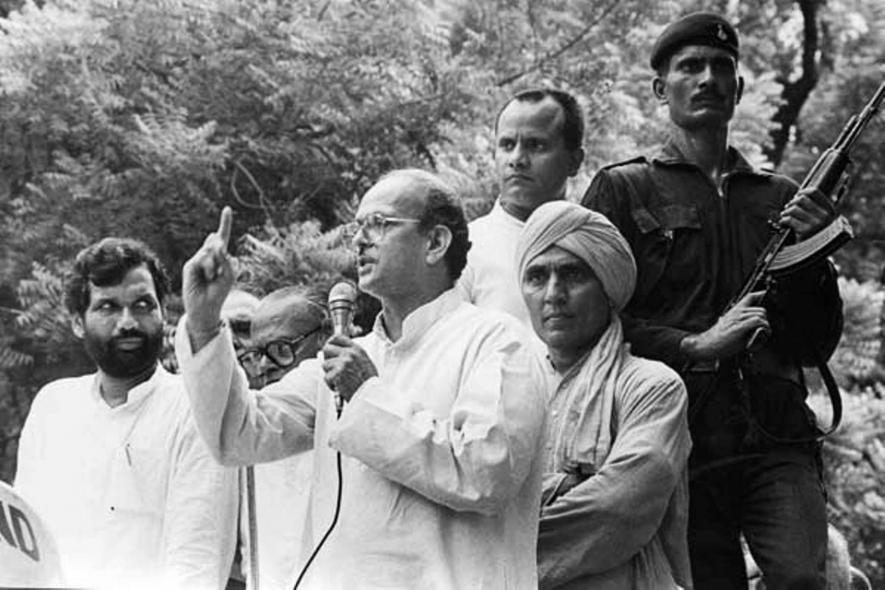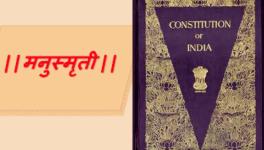Why OBCs Should Celebrate August 7 Every Year

Representational image. | Image Courtesy: Medium
When Prime Minister Narendra Modi performs on 5 August the bhoomipujan for the Ram temple in Ayodhya, many will lament the Indian state’s failure to have equal respect for all religions. In their lament they will likely fail to notice yet another significant development—that of Hindutva’s triumph over social justice forces, which comprise Dalit and Other Backward Class leaders and their parties.
Social justice may have myriad meanings worldwide, but in India, particularly in the Hindi heartland, the term signifies the quest of the lower castes to break the stranglehold of the upper castes over structures of power and governance. Their quest gathered tremendous momentum because of Prime Minister VP Singh’s decision of 7 August 1990 to grant 27% reservation to the Other Backward Classes in central government jobs.
That quest of OBC leaders has floundered, perhaps it is even forgotten. Their forgetfulness will be manifest on 7 August. None of OBC leaders and their children have thought of celebrating, as of now, the 30th anniversary of the day on which their long struggle to participate in governance at the federal level yielded fruit.
This struggle dates to 1902, when the ruler of Kolhapur introduced reservation, followed by the maharaja of Mysore in 1921. In that year, the Justice Party, after coming to power in Madras Presidency, kept aside 48% of all administrative posts for non-Brahmins.
Yet reservations as a means to socially diversify the power structure was repeatedly stalled at the national level. The report of the first Backward Classes Commission, which was appointed in 1953, was rejected because then Home Minister GB Pant felt it would compromise administrative efficiency and penalise the most meritorious.
In 1978, the Janata Party constituted the second Backward Classes Commission under BP Mandal. In his report, submitted in 1980, Mandal recommended 27% reservation for the socially and educationally backward classes, aka as OBCs, in central government jobs. By 1980, however, Indira Gandhi’s Congress returned to power—and the Mandal report continued to gather dust until Singh announced his decision to accept it on 7 August 1990.
It took nine decades for OBC reservations to become a reality at the federal level. Yet 7 August has been forgotten. It is vital for any socio-political movement to create and perpetuate memories and symbols for negotiating the future, to retain its relevance for successive generations that did not witness momentous occurrences.
This is precisely what the Rashtriya Swayamsevak Sangh and its affiliates have achieved. Think of the many milestones Hindutva crossed on its way to the bhoomipujan of 5 August. On the night of 22-23 December 1949, the idol of Ram was surreptitiously installed in the Babri Masjid; on 1 February 1986, the locks on the gates of the Babri Masjid were opened; on 6 December 1992, the Babri Masjid was demolished. All these dates have been stitched together in a narrative memorialising Hindutva’s grand march to realise its destiny. (It is another matter that these dates, for many, are also a reminder of the trauma inflicted on the nation.)
A reconstruction of the memory surrounding 7 August will, for sure, interrogate the history that Hindutva has constructed. It will tell us about the backlash of the upper castes against 27% reservation—and the illiberal sentiments a large segment of them expressed. It will tell us about the media’s role in fanning the protests against Mandal. It will tell us that South India did not burst out in protests because its long history of reservations had given OBC leaders control over the levers of power there.
The rekindling of the memory of 7 August 1990 will bring into sharp focus Hindutva’s ploy to prevent the consolidation of OBCs. That ploy involved Bharatiya Janata Party leader LK Advani embarking on a rath yatra to drum up support for appropriating the Babri masjid in Ayodhya for building the Ram temple. Ram was pitted against Mandal, in the hope that the Hindu religious identity will subsume caste identities, a mission considered worthy enough to justify the countrywide trail of death and devastation that Advani’s rath yatra left in its wake.
Yet the BJP was stopped at 51 seats in Uttar Pradesh in the 1991 Lok Sabha elections, even though the Janata Dal, to which VP Singh belonged, witnessed a split. The reconstructed memory of 7 August will tell us that the Opposition alliance in undivided Bihar, led by Lalu Prasad Yadav, won 49 out its 54 Lok Sabha seats. It will tell us that the BJP failed to win the 1993 Assembly election in Uttar Pradesh, just a year after its activists demolished the Babri masjid, because of the electoral alliance between the Samajwadi Party and the Bahujan Samaj Party.
The reconstructed memory of 7 August will tell subaltern groups that their quest for participation in governance will remain unrealised as long as they remain disunited. It will tell them that their shrinking support base cannot be augmented by upper caste voters, who will persevere to retain their traditional dominance, as they did in 1990, rather than share power with them.
The need to commemorate 7 August is more compelling now than previously, as India’s caste-based illiberalism shows signs of flowering all over again. Take the recent proposal to include salary for computing the income of a person’s parents, to determine whether he or she belongs to the creamy layer of the OBCs. Those deemed to belong to the creamy layer cannot avail of reservations.
It is feared that a stringent norm to determine the creamy layer will make it inordinately difficult for the OBCs to fill jobs reserved for them, a point the Parliamentary Committee on Welfare of OBCs harped upon in its report on the creamy layer. The committee cited government data to show that, even under the existing method of excluding salary to calculate a person’s income, the OBCs constituted only 13% of Group A services and 14.8% of Group B services.
The Modi government hitched cynicism to illiberalism to announce 10% reservation for the Economically Weaker Sections, that is the poor among socially and educationally advanced groups, last year. This decision was in contradiction to the very philosophy of affirmative action, which is never based on the economic criterion alone. It also violated the Supreme Court-mandated cap of 50% on reservation. Yet the apex court did not stay the decision, as it had the Mandal reservation in 1990.
The 10% quota cocked a snook at the OBC leaders, who had always argued, whenever the demand to grant reservation to the EWS was raised, that the benefits of removing the 50% cap on reservation should be given to them before any other social groups. They quoted Mandal to point out that he did not recommend an OBC quota in proportion to their population of 52% only out of respect for several Supreme Court judgements capping reservation at 50%. It does seem the government exploited Mandal’s magnanimity to grant reservations for EWS.
Indeed, it requires a sociological analysis to comprehend why, over the last two-three years, there has been an institutional pushback against socially progressive legislations. For instance, in 2018, the Supreme Court diluted the SC and ST (Prevention of Atrocities) Act, but protests from Dalits prompted the government to restore the status quo ante. In the same year, the judiciary upheld the University Grants Commission’s decision to calculate the number of reserved posts at the department rather than the university level, as had been the practice earlier. This method of calculation would have substantially reduced the number of reserved jobs in universities. Months of protests compelled the government to reverse the judicial verdict. Again, in February, the Supreme Court ruled that reservation in promotion in government jobs was not a fundamental right.
Since 2017, OBCs have been denied their 27% quota in the National Eligibility cum Entrance Test for medical colleges. These seats have been transferred to the general category, amounting to a loss of around 11,000 seats for the OBCs over the last three years. Only this week, the Chennai High Court directed the Central government to constitute a committee to decide on this contentious issue.
The government’s decision to privatise public sector units and permit lateral entry into the bureaucracy will further undermine reservations, as Christophe Jaffrelot and A Kalaiyarasan argued in a recent piece in the Indian Express. They observed, “The trajectory of positive discrimination in India suggests that the implementation of this policy is a function of the political clout of Dalits and OBCs.” In other words, they gain when parties representing them are in ruling coalitions or have the numbers to check the government from circumventing their interests.
The pushback against the “silent revolution”, a term coined by Jaffrelot, will continue to intensify as long as lower castes, especially the OBCs, do not recover and renew their memories of their century-long struggle for social justice. This is particularly true of the Hindi heartland, where it is perhaps impossible to find a public building named after VP Singh. By contrast, his name was given to a marriage hall in Thirupatthur town, Tamil Nadu. Again, the library at the Periyar Maniammai University, Trichy, has been named after Arjun Singh, who introduced reservation in higher education during his tenure as HRD minister.
As Hindutva blows the conch on 5 August, OBC leaders should try, even at this late stage, to commemorate 7 August for deepening the consciousness of their supporters. A movement without a remembered and shared past cannot possibly have a future.
The author is an independent journalist. The views are personal.
Get the latest reports & analysis with people's perspective on Protests, movements & deep analytical videos, discussions of the current affairs in your Telegram app. Subscribe to NewsClick's Telegram channel & get Real-Time updates on stories, as they get published on our website.























